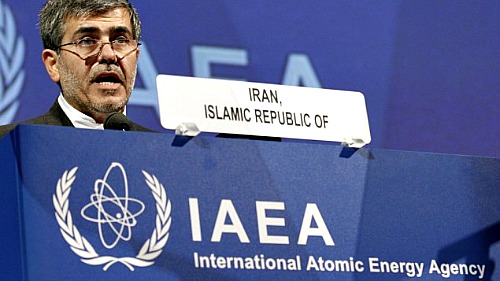Archives
AND MORE...

Oops, They Meant It...
____________________

WH More Worried About Israel Than Nuclear Iran
_____________________

Risk-Averse Spies
_____________________

Crackerjack Report
____________________

Ayatollah Hitler
_____________________
September 20, 2012
We Lied
In an interview published in the London-based daily Al-Hayat on Thursday, Iranian Vice President Fereydoon Abbasi-Davani, who is also the head of the Atomic Energy Organization of Iran (AEOI), said that misleading facts were used to protect his country’s nuclear program and to disguise some of the technical advances it has made (see below).
This is what Iran is willing to admit. Imagine what it's not admitting?
Have you seen much coverage in American, or for that matter world media about this little tidbit of news? On the other hand, how many have heard about the new iPhone 5, for example?
MEMO To World: This is why a country like Israel must NEVER rely on America (including American Jewry), much less the rest of the world, for they all have a nasty habit of coming late to the party, i.e., after the fact, or postmortem.
Times of Israel | September 20, 2012
Iran Admits It Deceived The West Over Nuclear Program
We had no choice, head of Tehran's atomic energy agency says, since UN watchdog was bent on making accusations stick.
By Stuart Winer

Fereydoon Abbasi-Davani, Iran's vice president and the head of its nuclear program, delivers a speech at the general conference of the International Atomic Energy Agency in Vienna, Austria, Monday, September 17, 2012 (photo credit: AP/Ronald Zak)
Iran deliberately provided false information about its nuclear program to Western investigators and the International Atomic Energy Agency, a senior Iranian official has confirmed.
In an interview published in the London-based daily Al-Hayat on Thursday, Iranian Vice President Fereydoon Abbasi-Davani, who is also the head of the Atomic Energy Organization of Iran (AEOI), said that misleading facts were used to protect his country’s nuclear program and to disguise some of the technical advances it has made.
He did not elaborate on what specific part of the program was lied about. Israel and much of the West believe Tehran has covered up efforts to build a nuclear weapon.
“Sometimes we pretended to be weaker than we really were, and sometimes we showed strength that was not really in our hands,” Abbasi-Davani said in the interview. “We had no choice.”
Abbasi-Davani complained that the attitude of International Atomic Energy Agency (IAEA) officials sent to review the nature of his country’s nuclear program was that Iran was guilty unless proven otherwise.
The West was leveling accusations against Iran, and the IAEA was determined to corroborate those claims in the same way it was with Saddam Hussein in Iraq, he said.
On Monday, Abbasi-Davani charged that ”terrorists and saboteurs” might have infiltrated the IAEA in an effort to derail his nation’s atomic program. More specifically, he claimed, inspectors had arrived at the underground Fordo uranium enrichment facility on August 17, shortly after power lines were blown up.
“Does this visit have any connection to that detonation?” he asked.
Menashe Amir, an Iranian-born analyst for Israel Radio, said Iran, in claiming that its power supply at Fordo was sabotaged, and in saying it had to lie over its nuclear program because of IAEA bias, “is seeking to justify barring IAEA inspectors from the key nuclear facility at Parchin.”
The idea, he said, was to assert that the IAEA is compromised, and thus to avoid complying with its demands.
The IAEA — which has so far failed to gain access to the Parchin nuclear site, where it believes traces of nuclear tests can be found — called Tuesday for Iran to cooperate with inspectors.
A meeting on Tuesday between six world powers and Iran yielded no breakthroughs, even as leaders said they would continue to pursue diplomatic avenues and sanctions to convince Tehran to curb its nuclear program.
European Union foreign policy chief Catherine Ashton said the five UN Security Council nations and Germany, known as the P5+1, would discuss ways of breaking the impasse over Iran’s nuclear program on the sidelines of the United Nations General Assembly in New York next week, Reuters reported.
Meanwhile, Iran and the UN’s atomic watchdog, engaged in concurrent talks over access to nuclear sites, are reportedly aiming to meet next month to continue talks over the program, AFP reported, quoting diplomats close to the negotiations.
Iran says its nuclear program is peaceful, though Israel and many Western powers dispute the claims. On Sunday, Prime Minister Benjamin Netanyahu, who has reportedly agitated for a military strike — or at least the credible threat of such action — said the Islamic Republic was nearly 90% of the way toward building a nuclear bomb.
Joshua Davidovich and AP contributed to this report.
Original article here.
Log In »
Notable Quotables
"Mr. Netanyahu is one of the most media-savvy politicians on the planet. On Friday he appeared live via video link on 'Real Time with Bill Maher,' taking the host’s alternately sardonic and serious line of questioning with gazelle-like alacrity."
~ Anthony Grant, jourrnalist who has written for many major newspapers and worked in television at Paris and Tel Aviv, interviewing former PM Benjamin Netanyahu on Monday, at the outset of Mr. Netanyahu's new book (more here).
And Then Some
Dangling Israel
March 24, 2022
New Global Leaders
March 23, 2022
Ukraine Can Learn From Israel
January 31, 2022



